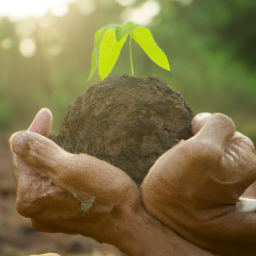Gardening Environment How Does It Help
How Does Gardening Help The Environment
How Does Gardening Help The Environment?
Conservation of Natural Resources
Gardening is a great way to conserve natural resources such as water, soil, flora, and fauna. By selecting native plants for your garden and using organic gardening practices, you reduce water usage while also reducing your impact on the environment. Gardening can also be used to reduce erosion, preserving soil quality and supporting a health ecosystem. Avoiding synthetic fertilizers, pesticides, herbicides, fungicides, and other chemicals will help keep soils healthy, soil microorganisms active, and beneficial insects and wildlife around.
Carbon Capture and Storage
Gardening helps capture and store carbon through photosynthesis, which requires light and water. Photosynthesis is the process of plants converting carbon dioxide (CO2) from the air into carbohydrates (starch and sugar) and oxygen. Carbon is stored in plants and the soil, further helping to reduce levels of carbon dioxide in the atmosphere. Trees, shrubs, and other perennial plants further contribute to carbon storage, helping to balance out emissions from fossil fuels.
Natural Pest Control
By promoting biodiversity in your garden, you create a healthier habitat that will naturally attract beneficial insects. This is nature's way of controlling pests. For example, lady bugs, lacewings, predatory wasps, and hoverflies are all beneficial insects that feast on harmful insects like aphids and spider mites. Diverse gardens, with a variety of plants, also draw beneficial birds, which, in turn, prey on undesirable insects. Planting a diverse garden also helps reduce the use of toxic pesticides, which are harmful to the environment.
Reduced Emissions
Growing your own food reduces your reliance on food that must often travel thousands of miles before reaching grocery stores. This helps reduce carbon emissions associated with long-distance food transportation. Furthermore, gardening requires minimal energy; most of the work is done with hand-operated tools instead of electric or gas-powered machines. This further reduces your environmental footprint.
Habitat and Food Source For Wildlife
By striving for a diverse garden, you can provide food, shelter, and habitats to local wildlife. For instance, include sources of food such as native plants and flowers, or provide nesting areas for birds with brush piles or plantings of taller shrubs. Offering natural sources of food helps birds, butterflies, and other beneficial insects, further helping to balance out the local ecosystem.
Improved Air Quality
Trees, shrubs, and other plants help improve air quality. Plantings of trees filter out pollutants from the air while releasing oxygen. Planting trees also helps reduce noise from roads and other sources, and can decrease wind speed up to 70%. However, be sure to select native plants to prevent the spread of invasives.
Reduced Waste
Gardening helps reduce the amount of waste sent to landfills. Composting kitchen and yard scraps helps to reduce waste while also providing additional nutrition and beneficial organisms to the soil. Furthermore, using natural, environmentally-friendly pest control such as, companion planting, mulching, and barriers helps to reduce the reliance on chemicals.
Brief Recap
Gardening is a great way to help the environment by conserving natural resources, storing carbon, controlling pests naturally, reducing emissions and waste, improving air quality, and providing habitat and food for wildlife. Additionally, gardening improves mental and physical health and provides many other benefits.
Looking Ahead
The benefits of gardening are numerous and when done responsibly, can help our planet in numerous ways. As the global population continues to grow and the effects of climate change become more visible, it's important to understand the positive impacts gardening has on the environment. Hopefully, this article encourages more people to start gardening and reap the rewards of their hard work for the environment, their families, and themselves.

Previous Page
Next Page
